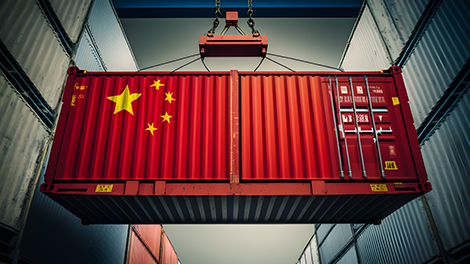Having been implemented in June 2023, the UK’s Developing Countries Trading Scheme has now been in force for over 12 months and represents a significant opportunity for importing and exporting businesses in the UK. The scheme replaced the Generalised Scheme of Preferences (GSP), but is much more extensive in its benefits for business.
It’s an initiative designed to streamline trade with lower-income nations. However, as our article at the time covered, the new scheme means UK businesses can source thousands of products from around the world at lower cost, courtesy of zero or reduced tariff rates. So, there are benefits for all parties involved.
In this article, we will explore the specifics of how importing businesses can benefit from the UK’s DCTS.
Reduced tariffs and increased profit margin on imports from 65 nations
So obviously, one of the most significant advantages of the DCTS is the reduction or elimination of tariffs on goods imported from developing countries. This reduction directly translates into lower costs for UK businesses sourcing raw materials or finished products from these countries.
So by exploring import opportunities in the following nations, you could find a new best supplier.
Countries included as part of the DCTS
| Comprehensive Benefits | |||||||
| Afghanistan | Burundi | Djibouti | Guinea-Bissau | Madagascar | Nepal | Solomon Islands | Uganda |
| Angola | Cambodia | East Timor | Haiti | Malawi | Niger | Somalia | Vanuatu |
| Bangladesh | Central African Republic | Eritrea | Kiribati | Mali | Rwanda | South Sudan | Yemen |
| Benin | Chad | Ethiopia | Laos | Mauritania | Sao Tome & Principe | Tanzania | Zambia |
| Bhutan | Comoros | The Gambia | Lesotho | Mozambique | Senegal | Togo | |
| Burkina Faso | Democratic Republic of the Congo | Guinea | Liberia | Myanmar | Sierra Leone | Tuvalu | |
| Enhanced Preferences | |||||||
| Algeria | Cape Verde | Cook Islands | Federated States of Micronesia | Nigeria | Pakistan | Sri Lanka | Tajikistan |
| Bolivia | Republic of Congo | Kyrgyz Republic | Mongolia | Niue | Philippines | Syria | Uzbekistan |
| Standard preferences | |||||||
| India | Indonesia |
| Product tariff | Comprehensive Preferences | Enhanced Preferences | Standard Preferences |
| Tariff free products (0%) | 99.8% | 92% | 65% |
| Products with 0% to 5% tariffs | 0.2% | 0.4% | 10% |
| Products with 5% to 10% tariffs | 0.0% | 0.4% | 12% |
| Products with more than 10% tariffs | 0.0% | 7.2% | 13% |
To benefit from these reduced tariffs, UK businesses need only prove Rules of Origin to customs officials. This means they must be able to prove the import is ‘from’ the country where reduced duty rates are applied.
This can take many forms. In some cases, such as raw materials, it can be easy to identify that the goods are indeed from the DCTS country. However, businesses can benefit from RoO if goods have been manufactured enough for their commodity code to change, even if the raw materials are sourced from other nations.
These are just two examples of how Rules of Origin are applied relating to the DCTS. For comprehensive details on what constitutes goods originating ‘from’ a DCTS country, see the UK government’s PDF guide here.
Proof of compliance with Rules of Origin comes in the form of an origin declaration, which you can view a template of here. Meanwhile, the UK government’s Online Trade Tariff gives you specific details on what duty rates are applied to commodity codes, so you can see if your import portfolio would be taxed from a DCTS country.
Of course, any savings can be reinvested into R&D, marketing, or expanding operational capacities. Reducing tariff costs improves overall business competitiveness.
Increasing supply chain diversity
Diversifying supply chains has become strategically important for businesses worldwide these days. The Red Sea diversion of 2024 and the Covid-19 pandemic highlighted the world’s increasing volatility. We’re seeing far more emphasis on supply chain diversity at boardroom level.
The DCTS opens up new avenues for sourcing goods from a broader range of countries, reducing dependency on a single market and mitigating risks associated with supply chain disruptions.
By leveraging the DCTS, UK businesses can establish more resilient supply chains, ensuring continuity and stability in their operations. For instance, instead of relying solely on one country for electronic components, businesses can perhaps source from multiple nations, each benefiting from reduced tariffs and streamlined trade processes.
“Dual sourcing can increase expected market output and improve profits for firms in uncertain supply chains with strong supplier correlations.”
Biggest individual UK import partners from the comprehensive partners list (£bn)

Improved access to emerging markets
Whilst exporting opportunities created by the Developing Countries Trading Scheme are more limited, they do exist. The DCTS can be used to build your presence in significant developing countries which boast an expanding consumer market.
Emerging markets often exhibit rapid economic growth and increasing consumer spending, presenting lucrative opportunities for UK exporters.
Just look at India, which is forecast to see GDP growth of between 6.5% and 7% in 2024. Meanwhile, sub-Saharan Africa is expected to see GDP growth of 3.8%. Both highlight the immense opportunities presented by growing your footprint in these regions through supplier relationships and other contacts.
Ethical sourcing and improved ESG
UK companies which contribute more positively to the world around them can strengthen their brand reputation by highlighting their commitment to ethical sourcing from developing nations.
Sourcing goods from DCTS nations feeds into this. These are countries recognised by the UN as needing support and investment. Taking your business there and ensuring ethical practices are followed has directly positive impacts on their inhabitants.
It could also be the case that doing so reduces the environmental impact of products too. Transportation is one of the greatest contributors to overall product emissions, so using a supplier closer to the UK could significantly reduce scope 3 emissions.
“Businesses who are ethically responsible not only enjoy the benefits of having a positive, meaningful impact on the world, but also increasingly, are sitting on the right side of consumer expectations. Across developed economies we’re seeing social and environmental credentials driving consumer decisions.
Sourcing products from low-income countries listed as part of the DCTS can certainly factor into that.”
Elaine Evans, People and Culture Director, WTA
Simplified customs procedures with imports
Of course, one of the greatest ways to remove concerns over customs bureaucracy is to source from countries where a 0% tariff is applied. Beyond that, part of the DCTS’s role is to simplify customs processes, making trade easier. The scheme includes provisions for streamlined documentation and faster customs clearance, reducing delays and associated costs.
If concerns remain, partnering with an experienced logistics provider with customs expertise can remove them. These providers should offer expertise in managing customs regulations, ensuring that businesses remain compliant while benefiting from the efficiencies introduced by the DCTS. With these partnerships, businesses can focus on their core operations without the burden of navigating complex customs procedures.
“Efficiency savings in customs is an underutilised area of cost saving in logistics. Customs is such a burden, companies that seek out proper guidance are likely to enjoy the benefits of the best duty rates, fewer mistakes and quicker processing.”
Jamie Craig, Customs Consultant, WTA
Access to government support and additional resources
Despite the UK government changing in 2024, it still wants this scheme to succeed. It’s committed to supporting businesses in maximising the benefits of the DCTS. Various resources and advisory services are available to help businesses understand the scheme, identify opportunities, and navigate any challenges that may arise.
The UK government provides pages of guidance and support online, helping businesses in their trading with a wide range of developing countries.
Beyond that, trade missions and networking events organised by the government can help businesses connect with potential partners and explore new markets. These initiatives provide valuable insights and facilitate meaningful business relationships, further enhancing the potential for growth and success under the DCTS.
The Developing Countries Trading Scheme presents various financial and growth opportunities for UK businesses. These include reduced tariffs, diversified supply chains, emerging market access, and enhanced competitiveness. Moreover, the scheme's emphasis on simplified customs procedures ensures that businesses can navigate the complexities of international trade with confidence.
As a logistics service provider, we encourage businesses to explore the potential the DCTS offers. By leveraging the support and resources available from a good service provider, businesses can unlock new markets, drive innovation, and achieve long-term success. Partnering with experienced logistics experts can further streamline the process, ensuring that businesses remain compliant and efficient while capitalising on the opportunities presented.







